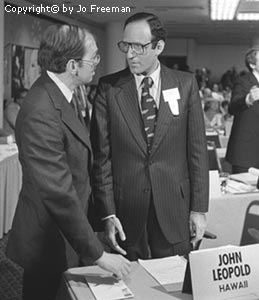REPUBLICANS: FEMINISTS AVOID A DIRECT
SHOW DOWN (at the 1980 Republican convention)
by Jo Freeman
Published in In These Times, Vol. 4, No. 32, July 30, 1980, p. 5.
See 1980 Republican Convention photos.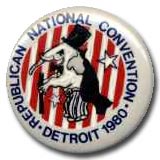
Feminist presence at the 1980 Republican convention was significantly less than in 1976, even though issues such as the Equal Rights Amendment and abortion were more publicly prominent than ever before. Overwhelmed by conservative Ronald Reagan delegates, the Republican Women's Task Force (RWTF), an affiliate of the National Women's Political Caucus, gamely resisted total annihilation of their issues and their influence with fewer, less organized resources than four years ago.
As in 1976, the RWTF sent a questionnaire to all delegates prior to the convention. According to chair Nancy Thompson, the results were so discouraging the RWTF decided not to publish them. Her cursory review of 400 returned questionnaires showed a four-to-one opposition to the ERA, which has been in every Republican platform since 1940. In contrast, the 1976 survey showed a slight majority for the ERA.
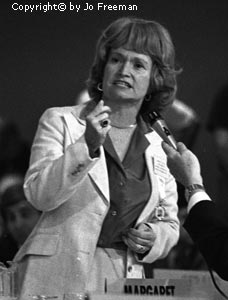 Margaret Heckler |
Despite this early indication of defeat, Thompson reported surprise at the 11-to-4 loss in the GOP platform subcommittee. Liberal Republican delegate Margaret Heckler of Massachusetts made a last-ditch effort to retain support for it in the full platform committee. Heckler urged the committee, which was half female under the convention rules, not to make the ERA an election issue. Even so, John Leopold's (HA) substitute motion was crushed 90-to-9.
Though the news media focused on the ERA as one of the few controversies at an otherwise placid convention, the RWTF's efforts were hampered by the fact that its ties to the Republican Party were through the declining liberal wing, which had vociferously opposed Reagan in 1976. Therefore, they recruited former GOP Chairman Mary Louise Smith, whose Republican credentials were too solid to be dismissed, as their spokesperson.
Her presence did encourage the antis to moderate their stand. The subcommittee proposal to the platform committee opposed not the ERA, but "federal interference or pressure ... against states that have refused to ratify the ERA," while reaffirming "our Party's historic commitment to equal rights and equality for women."
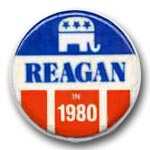 Immediately before the platform committee met, Reagan issues adviser Lorelei Kinder initiated further softening of the language, requesting both pros and antis to accept a sentence acknowledging "the legitimate efforts of those who oppose or support ratification." She knew the ERA did not have enough votes for a floor fight, but didn't want women she thought the RWTF represented to "feel left out." Expressing some concern that liberal Republicans might flock to John Anderson's banner, Kinder wanted the Reagan campaign to manifest an open, conciliatory attitude and maintain party unity.
Immediately before the platform committee met, Reagan issues adviser Lorelei Kinder initiated further softening of the language, requesting both pros and antis to accept a sentence acknowledging "the legitimate efforts of those who oppose or support ratification." She knew the ERA did not have enough votes for a floor fight, but didn't want women she thought the RWTF represented to "feel left out." Expressing some concern that liberal Republicans might flock to John Anderson's banner, Kinder wanted the Reagan campaign to manifest an open, conciliatory attitude and maintain party unity.
Mary Louise Smith accepted this olive branch as "an accommodation," while Representative Heckler demanded a personal meeting with Reagan. After this meeting, held Sunday before the convention, Heckler and the RWTF representatives who attended publicly stated that they would support Reagan because they didn't feel his views and the platform are perfectly congruent.
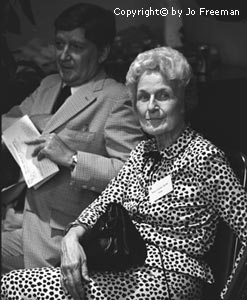 Mary Louise Smith |
One result of their effort appeared in Reagan's acceptance speech where he supported furtherance of women's equal participation without proposing specifics.
Clearly outnumbered and outorganized, RWTF felt they had gotten all that was possible this year. But their miniscule numbers and barely visible lobbying effort made such compromises look like a magnanimous gesture by a candidate sensing victory rather than a symbol of women's power.
Nonetheless, Reagan adviser Peter McPherson did not think such efforts were futile. "This whole process of battle and compromising on the ERA is sensitizing the party on women's issues."
Such sensitizing did not take place on abortion. The GOP platform supports the Human Life Amendment, and few voices beyond John Leopold's were raised in protest. As in 1976, the RWTF chose to concentrate on the ERA because they did not think the two issues should be "confused" and thought they only had the resources for one.
|
|
But in 1976 Representative Millicent Fenwick of New Jersey and a few other GOP women quietly lobbied for the elimination of any reference to abortion in the platform. They failed, but they did achieve a floor discussion.
This year, Fenwick was not present. Except for a Ripon Society press release, not a single button or any other sign of pro-choice sentiment appeared at the GOP convention. Yet not all delegates were anti-abortion.
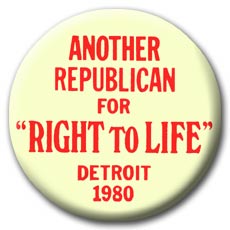 According to Marlene Elwell, chair of the Pro-Life Impact Committee, a delegate survey disclosed only 60 percent in support of a Human Life Amendment. She estimated that the lobbying of her 100-person group, formed solely for the convention, increased that support by 20 percent. This success was reflected in the platform committee vote on Leopold's amendment to the subcommittee's report for a neutral recognition of the right to differ on the issue of abortion. His motion was defeated 75-to-18.
According to Marlene Elwell, chair of the Pro-Life Impact Committee, a delegate survey disclosed only 60 percent in support of a Human Life Amendment. She estimated that the lobbying of her 100-person group, formed solely for the convention, increased that support by 20 percent. This success was reflected in the platform committee vote on Leopold's amendment to the subcommittee's report for a neutral recognition of the right to differ on the issue of abortion. His motion was defeated 75-to-18.
Would a pro-choice presence have made any difference? According to Lorelei Kinder, the Reagan campaign was prepared to listen to anyone. "If they had been lobbying [on abortion), the platform committee had many people who would have liked softer language. But we were never approached on abortion."
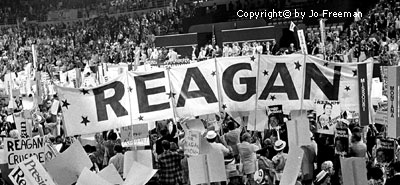
Books by Jo | What's New | About Jo | Photos | Political Buttons
Home | Search | Links | Contact Jo | Articles by Jo
